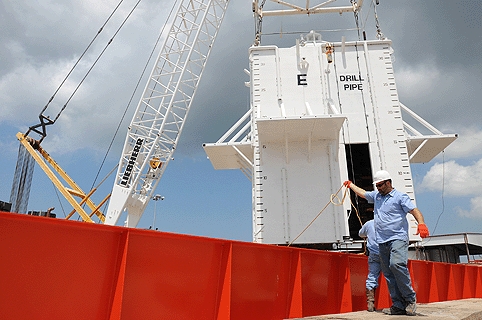The Deepwater Horizon rig, which exploded on 20 April, causing oil to gush out of the well head, was operating under extreme conditions in waters more than two miles deep and drilling a further 6.5 miles below the seabed.
Since then, efforts to contain the leak have been unsuccessful and the situation has become much worse. The Obama administration has given it the status of ‘a spill of national significance’, providing the option to use military resources as necessary.
Simon Boxall from the National Oceanography Centre at Southampton University believes that a crisis such as this was inevitable. ‘BP are in the unfortunate position of having to pioneer ways of dealing with it that are new and untested, and this will take weeks, if not months,’ he said.
BP, lease operater of the rig, has begun a three-month project to drill a relief well in 5,000ft of water to intercept and isolate the existing well at around 13,000ft below the seabed.
It is also carrying out an experimental technique that involves injection of dispersants directly into the oil flow at the point that it flows out of the riser. The method is intended to break up and disperse the oil, allowing it to degrade naturally and reduce surface impact.
Simon Rickaby, managing director of London-based oil-spill-response group, Braemar Howells, has been placed on standby by the US authorities in case added support is needed to contain the spill. He believes that traditional techniques will not be enough to contain the oil.
‘Containment-recovery operations need favourable weather conditions and a rate of encounter that cannot be achieved with thin films of oil,’ he said.
‘The same considerations make it difficult to coral oil with sufficient thickness in fireproof booms for sustained in-situ burning. Subject to amenability of the oil to treatment, dispersant spraying is effective but there is a question as to how long spraying operations should be continued and supplies are not limitless.’
In response to these concerns, BP is looking at a more radical approach and has constructed a 14 x 24 x 40ft steel canopy (cofferdam) to contain the spill. Once lowered over the leak site and connected by pipe, the canopy will channel the flow of oil from the subsea to the surface, where it could be processed and stored.
‘This, in theory, should be possible, but has never been done before at such depths,’ said Rickaby. ‘It could be a good solution if the technical problems can be resolved, allowing time for a relief well to be drilled. BP is working on this and, if there is no other breakthrough, it may be the best hope.’
Another technique that Rickaby proposes is to ‘crimp’ the riser below points of leakage, however the approach is untried and high-risk. ‘The engineering challenges would be huge and, if failure were to result in an unrestricted flow, the rate at which the oil is spilling could increase by a factor potentially of 10 or even more,’ he said.
The full extent of the ecological impact remains to be seen but, as Boxall puts it: ‘At 1,500m the head is as easy to get to as if it were on the moon. We just need to hope that the winds blow offshore and that oil engineers can come up with a solution to cap the well soon.’

Oil spill update
- A cofferdam has been loaded aboard a transport vessel at Port Fourchon, Louisiana. The 40x24x14 feet device is expected to be lowered to the seabed today, May 6 2010.
- A valve that had been attached to the end of a broken drill pipe, one of the three points from which oil was leaking, was closed. This has stopped the flow from this point, but is not expected to affect the overall rate of flow from the well. BP continues to use remotely operated vehicles to monitor the flow of oil from the other two leak points.
- The drilling of the first relief well, which began on Sunday May 2, continues. It is estimated that it will take some three months to complete.
Source: BP





Swiss geoengineering start-up targets methane removal
No mention whatsoever about the effect of increased methane levels/iron chloride in the ocean on the pH and chemical properties of the ocean - are we...